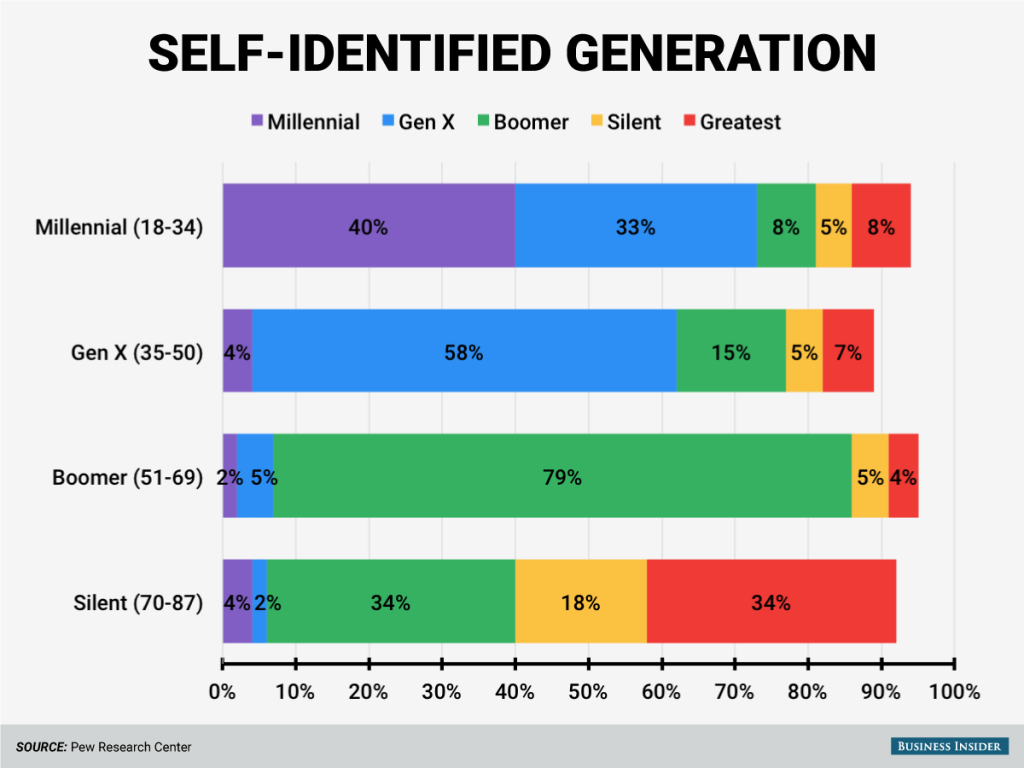How different age groups identify with their generational labels

Stay up to date:
Social Innovation
Pew Research Center recently posted a study on how strongly different generations identify with their generational labels. While Baby Boomers and Gen X-ers tend to place themselves in their respective groups, most millennials and members of the silent generation do not.
Pew identified four generation groups for American adults: Millennials, currently between the ages of 18 and 34; Gen X, between the ages of 35 and 50; Baby Boomers, aged 51 to 69, and the Silent generation, between 70 and 87. As part of their American Trends Panel survey, they asked respondents which generation they identified with.
The results were mixed: 58% of Gen-Xers identified as such, and a full 79% of boomers classified themselves that way. Meanwhile, just 40% of millennials identify as millennials, and only 18% of the silent generation self identified:
Business Insider/Andy Kiersz, data from Pew Research Center
Pew noted that many older millennials — those above the age of 27 — identified more with Gen X than with other millennials.
The study points out some of the limits of looking at generations: The cutoff lines between one generation and another are somewhat arbitrary, and multi-decade age cohorts are not really monolithic entities with one particular identity or another.
Millennials view their generation as self-absorbed
Another part of the study asked members of each of the generational groups to describe their generation as a whole. Respondents were given a list of traits and asked if each trait applied to their generation. A majority of millennials said that their generation was “self-absorbed”, and only 17% said that millennials as a whole were “moral.”
Pew noted that millennials were more likely to use negative terms to describe their generation than the other age cohorts, and less likely to agree with the positive descriptions.
Here are the percentages of millennials who agreed that different traits described their generation. Generally positive or neutral traits are in blue; generally negative traits are in red:

Business Insider/Andy Kiersz, data from Pew Research Center
This article is published in collaboration with Business Insider. Publication does not imply endorsement of views by the World Economic Forum.
To keep up with the Agenda subscribe to our weekly newsletter.
Author: Andy Kiersz is a quant reporter at Business Insider.
Image: Graduating students enter the Paladin stadium. REUTERS/Larry Downing.
Don't miss any update on this topic
Create a free account and access your personalized content collection with our latest publications and analyses.
License and Republishing
World Economic Forum articles may be republished in accordance with the Creative Commons Attribution-NonCommercial-NoDerivatives 4.0 International Public License, and in accordance with our Terms of Use.
The views expressed in this article are those of the author alone and not the World Economic Forum.
Related topics:
Forum Stories newsletter
Bringing you weekly curated insights and analysis on the global issues that matter.
More on Jobs and the Future of WorkSee all
Shakthi M Nagappan
July 7, 2025
Steffica Warwick
July 3, 2025
Ibrahim Odeh and Oliver Tsai
July 2, 2025
Ravi Kumar S. and Rohan Murty
July 1, 2025
Abayomi Olusunle
July 1, 2025



